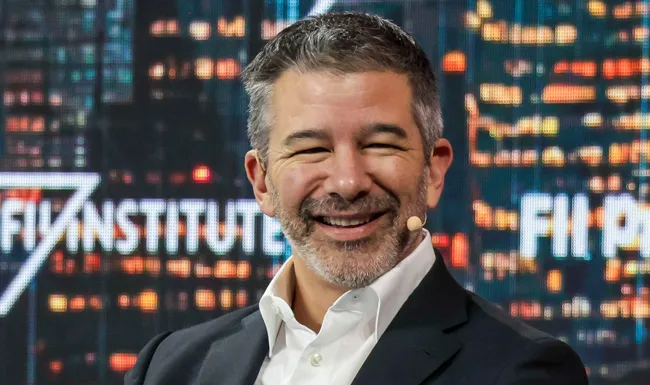In a surprising turn of events within the tech and automotive industries, Travis Kalanick, the co-founder and former CEO of Uber, is reportedly seeking to acquire the U.S. subsidiary of Pony.ai, a prominent player in the autonomous vehicle sector. This move, valued at approximately $4.5 billion (reflecting Pony.ai’s overall market capitalization), could reshape the landscape of self-driving technology and further solidify Kalanick’s influence in the industry.
According to insider reports from June 26, 2025, Uber is in preliminary discussions to provide financial backing for Kalanick’s acquisition efforts. This partnership, if realized, could mark a significant collaboration between the ride-hailing giant and Kalanick, who stepped down from Uber’s CEO position in 2017 amid controversies surrounding the company’s culture and governance.
The Landscape of Autonomous Vehicles
Pony.ai, founded in 2016, has made significant strides in the development of autonomous driving technology. The company has conducted extensive testing on public roads in both the United States and China, gaining valuable data and insights into self-driving systems. Its seventh-generation autonomous driving system is designed for scalable, cost-effective mass production and leverages NVIDIA DRIVE Orin™ for high performance and reliability. With a robust market capitalization of approximately $4.5 billion, Pony.ai stands out among its competitors as a leader in the autonomous vehicle space.
As the global demand for autonomous solutions grows, major tech companies are racing to dominate this emerging market. According to recent reports, the global autonomous vehicles market is projected to reach approximately 7 billion in 2026, a staggering increase driven by advancements in AI, machine learning, and sensor technologies.
Kalanick’s Vision and Strategy
Travis Kalanick’s interest in acquiring Pony.ai aligns with his long-standing vision of transforming urban mobility. After his departure from Uber, Kalanick has been involved in various startups and investments, most notably as CEO of CloudKitchens, a virtual restaurant startup. He has recently developed a strong interest in robotics, experimenting with automated kitchens.
“The future of transportation lies in autonomous technology, and I believe Pony.ai is at the forefront of this revolution,” Kalanick reportedly remarked during a recent tech conference, reflecting a renewed focus on robotics and autonomous technologies.
His bold move to acquire Pony.ai’s U.S. operations could potentially position him as a key player in the autonomous vehicle arena once again. Industry analysts speculate that Kalanick’s deep understanding of the ride-sharing market, combined with Pony.ai’s technological expertise, could create a formidable entity capable of competing with larger automotive manufacturers and tech giants.
Uber’s Role in the Acquisition
Uber’s involvement in the discussions raises questions about the company’s strategic direction under the leadership of its current CEO, Dara Khosrowshahi. Since taking the helm, Khosrowshahi has focused on stabilizing Uber’s operations and expanding its services beyond ride-sharing, including food delivery and freight logistics. He has also emphasized a “deploy as many cars as possible” strategy for autonomous vehicles on the Uber network, forging partnerships with approximately 18 autonomous driving companies. Uber is already integrating Waymo robotaxis into its service in cities like Austin and Phoenix.
By potentially supporting Kalanick’s acquisition, Uber could be signaling its commitment to remaining a major player in the autonomous vehicle revolution. This partnership could also provide Uber with direct access to cutting-edge technology developed by Pony.ai, which could be integrated into its existing platform to better compete with rivals. If the deal is completed, Kalanick would reportedly be responsible for operating Pony.ai’s U.S. subsidiary while remaining CEO of CloudKitchens.
Market Reactions and Future Implications
The news of this potential acquisition has sparked mixed reactions within the industry. Some investors view it as a strategic move that could revitalize both Kalanick’s and Uber’s positions in the market, while others express caution regarding the challenges of integrating Pony.ai’s technology into Uber’s operations and the complexities arising from the U.S.-China tech rift which has prompted Pony.ai to consider selling or spinning off its U.S. subsidiary.
Furthermore, as the autonomous vehicle market continues to evolve, regulatory hurdles and public acceptance remain significant challenges. Older Pew Research Center surveys indicate that public comfort with fully self-driving vehicles has been limited, with many Americans expressing worry about their development and a reluctance to ride in them. These public perception issues highlight the ongoing need for education and transparency around autonomous technologies.
Conclusion: A New Chapter for Kalanick and Uber?
As Travis Kalanick pursues the acquisition of Pony.ai’s U.S. subsidiary with the potential support of Uber, the implications of this deal extend beyond financial figures. It represents a critical juncture in the evolution of autonomous vehicles and urban mobility. If successful, this acquisition could not only reshape Kalanick’s legacy but also redefine the competitive landscape of the self-driving industry, particularly in addressing the growing competition from services like Waymo.
As discussions between Kalanick and Uber progress, stakeholders will be closely monitoring developments, assessing how this acquisition could impact the future of transportation. The intersection of technology, mobility, and innovation continues to be a fertile ground for disruption, and Kalanick’s latest endeavor may very well be a pivotal chapter in that narrative.

